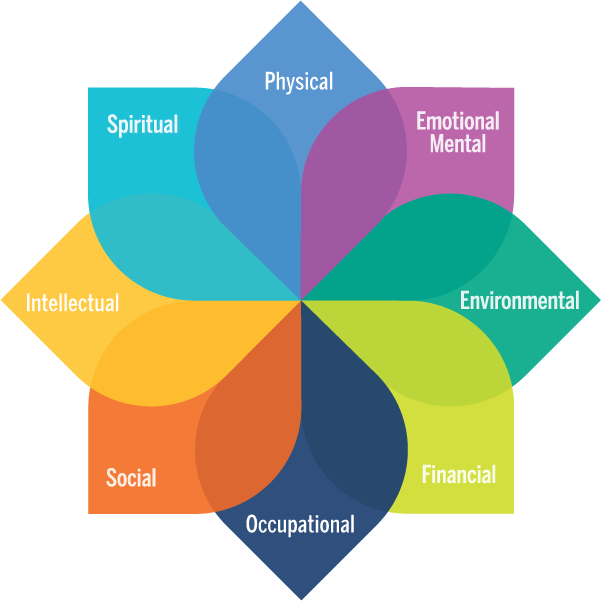Being back on campus is exciting, but it can sometimes be difficult to juggle moving in, the start of classes, student organizations, athletics, and social activities. We’ve compiled some information on what wellness looks like for students, and how we can utilize resources on campus to promote our own well-being. Wolverine Wellness lists eight different dimensions that make up a student’s well-being:
- Physical: The role that you take in maintaining your body for strength, vitality and energy.
- Emotional/Mental: Being aware and managing your feelings, being at peace with who you are, and having the tools you need to weather life's ups and downs.
- Environmental: Reflects the impact your environment (home, school, city, planet) has on you and the impact you have on the environment.
- Financial: Your relationship with money and skills for managing resources, as well as your ability to make good consumer choices and seek out appropriate financial opportunities.
- Occupational: The work you choose to do and how it contributes to your community and fulfills you.
- Social: How you choose to define and connect with your community and the people around you.
- Intellectual: Feeling stimulated and engaged with learning and staying open to new ideas and perspectives.
- Spiritual: Your understanding of your place and purpose, how you make meaning of what happens to you, and what your mind goes to for comfort or relief.
The university offers a wide variety of resources and opportunities that align with these dimensions to help students’ well-being. The following list describes different resources on campus that can assist with each of the eight dimensions.
- Physical: Group-X is a program through Recreational Sports that allows students access to different kinds of group fitness classes. You can sign up for individual classes, or buy a student pass ($35-$75) to attend unlimited classes all semester long! Group-X classes are free through Sunday, September 11th.
- Emotional/Mental: Student Life Counseling and Psychological Services offers individual, relationship, and group counseling/support. They also have free and confidential psychological services for students experiencing a crisis or urgent situation.
- Environmental: Beyond the Diag, UM’s off-campus housing program, connects students living off-campus with resources for and information on safety, leasing, roommates, and community building.
- Financial: The Maize and Blue Cupboard provides students with access to free, healthy, nutritious, and nourishing food. This resource is open for all, especially students who are struggling financially or who are unable to access grocery stores. They provide food, kitchen and cooking supplies, and personal and household supplies. Click on the link provided to learn more about their location, hours, and how you can help out.
- Occupational: The University Career Center assists students in transitioning from university life to the workforce. They offer resources such as resume assistance, a free “Clothes Closet” with business professional clothing, interview assistance, and networking resources. The University Career Center also offers specific resources for DACA students, LGBTQ students, students with disabilities, and student veterans.
- Social: The Center for Campus Involvement supports over 1,400 student organizations and helps students get connected with the community. Every student is bound to find an org that fits their interests… but if you can’t, you can always start your own org!
- Intellectual: The Newnan Academic Advising Center offers LSA learning centers for all students. Learning centers cover one-on-one writing assistance, science study groups, a math lab, a language resource center, and a physics help room. There is also tutoring, which can either be provided for free, or could be a paid service. For other schools and colleges, please visit the college website for additional details on the support available to you. Alternatively, please contact the Dean of Students Office, and we would be happy to assist with your inquiry.
- Spiritual: The Trotter Multicultural Center has several programs and events to assist students in connecting to their own cultures/faiths, while also exploring those of other people. The Interfaith Program encourages students to explore their own religious, spiritual, and secular identities to make connections with peers coming from different backgrounds and experiences.

